Dr Olivia Sheringham, from Birkbeck’s School of Social Sciences reflects on a collaborative, creative research project exploring meanings and practices of care with people navigating the UK’s asylum system, which culminated in a weekend residential workshop in the Kent countryside.
How can we take this care back to London?
This was just one of the many questions emerging from last weekend’s two-day ‘residential’ workshop, the culmination of a series of workshops developed as part of the ‘Home-City-Spaces of Care’ project. This project – a collaboration between myself (Olivia Sheringham), Stories & Supper and Phosphoros Theatre – has sought to explore creatively what care means and where it ‘happens’ with people whose lives are marked by a stark absence of official care through the UK’s brutal border regime and the hostile environments that it creates and sustains. Yet rather than solely foreground the violence of this lack of care, we have employed a range of activities to shine a light on the networks and practices of care that already exist and to imagine what a more caring city, society and world would look like.

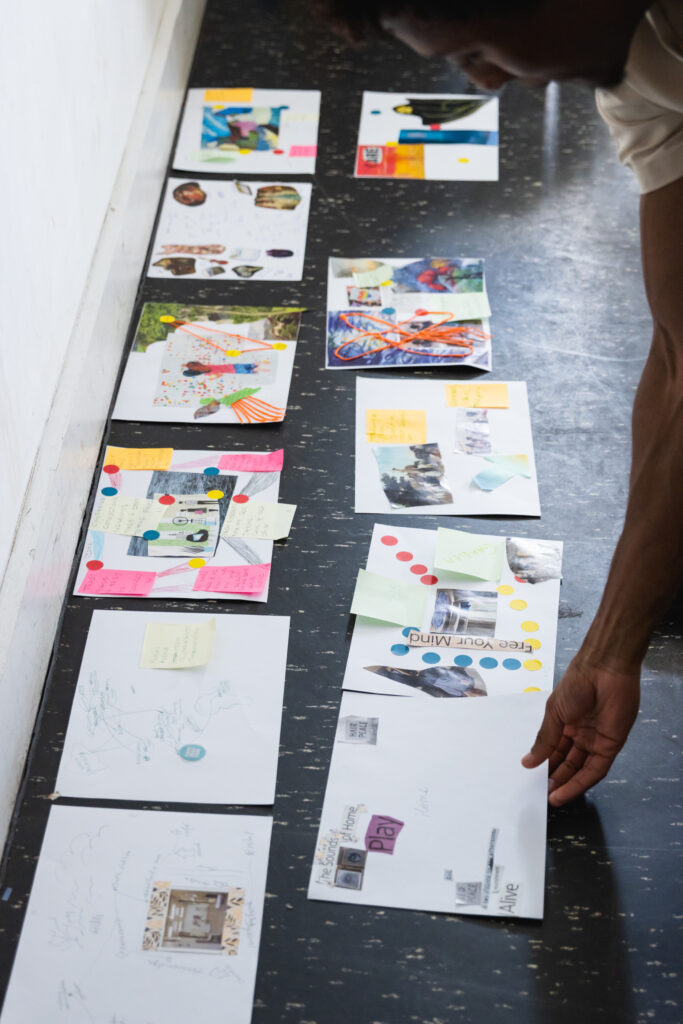
Images © Laura Martinez
Following a series of ten workshops – held at the William Morris gallery in Walthamstow, London – this weekend in the countryside offered the chance to go deeper: to expand our understandings of what care means, and to care for each other – and ourselves – through spending time in nature, cooking and sharing food together, and making music by the campfire. So, on a sunny Friday afternoon in early May, a group of 18 people arrived at a Woodcraft Folk activities centre in North Kent. The group consisted of 11 people who had been participating in the workshops and were currently experiencing the UK’s asylum system. It also included the workshop facilitators: Abel and Kate from Phosphoros, Carine and Helen from Stories & Supper, and me as researcher and PI on the project. Finally, we were accompanied by Rebekka Hölzle, PhD student at Birkbeck and creative practitioner/activist whose role was to work with participants to document the weekend’s activities, and filmmaker Natalie Sloan who came to support us in creating a film from the weekend.
As the finale of a bigger project, there had been a long build-up to the weekend. Yet it was still hard to envisage what it would bring and how the group dynamics would work. We had never been away together as a group, and several of the participants had never left London. We were sleeping in shared rooms (dormitories – designed for children as we discovered on the first night!) and the plan was for everyone to get involved in preparing meals which we would all share around a big table. As we arrived at the centre after a train journey followed by a taxi ride along narrow country lanes with views across hills and woodland, there was already a sense that the space would ‘take care’ of us. Several people commented on how the environment reminded them of places ‘back home’: Farhad Ali (from Bangladesh) said he was transported straight back to his childhood and the farm on which he grew up; Ruva (from Zimbabwe) and Mary (from Nigeria) talked about how the rural landscape and wild animals reminded them of places they remembered in Africa. Aati (from Pakistan) likened the windy roads to the ones surrounding her home village, though ‘back home’ the sheer drops beneath them were much more dramatic. The sound – of silence – was palpable.
That first evening we shared a delicious dhal and baked chicken prepared by a cooking team led by Carine; home-cooked paratha, jointly prepared by Farhad Ali and Nazir who shared recipes passed on by their mothers and created a combination of the two; and a blackberry and apple crumble made by Helen and me. A self-assigned ‘fire team’ went down to the bottom of the field to make a campfire, around which the whole group assembled after dinner to drum rhythms and to share songs and stories. Whilst some people slowly trickled off to their beds, a core few stayed, making music – in harmony with the bats and owls – until the early hours.
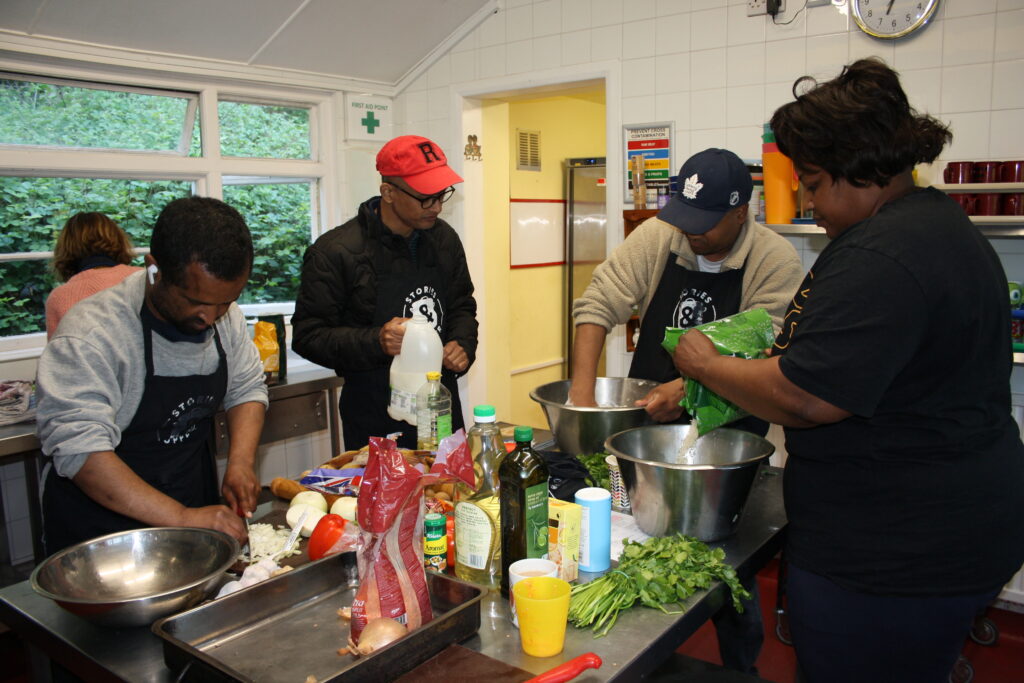
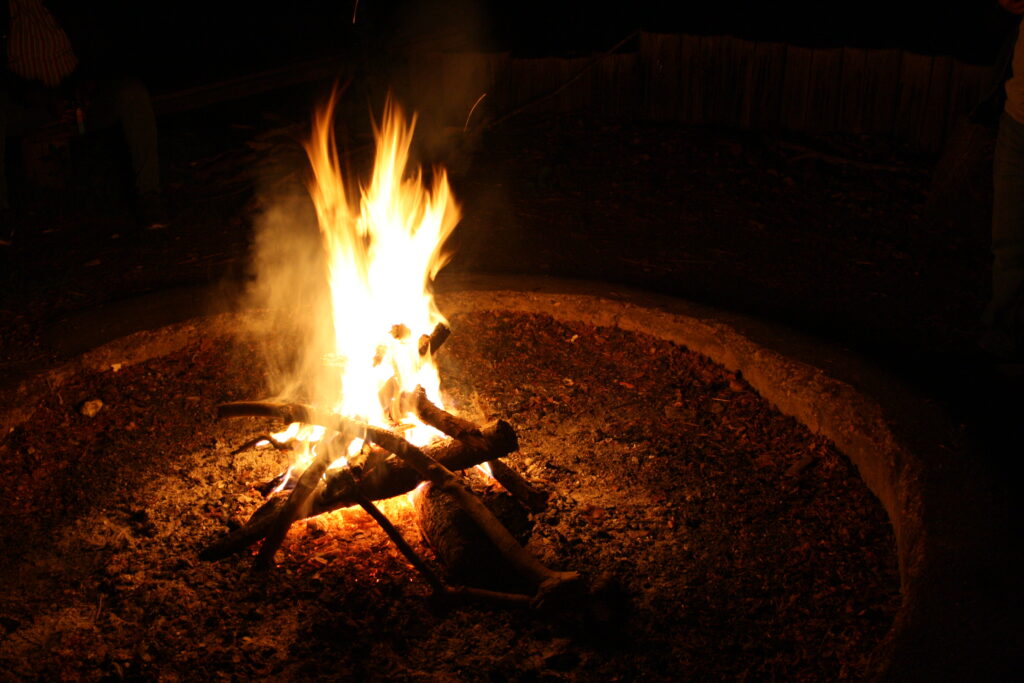
Image 4: Campfire.
Images © Helen Taylor
The energy of this first evening carried over into the next day as we woke to birdsong and bright sunshine and the morning mist cleared over the valley below our dorms. Gradually members of the group appeared for breakfast – porridge and toast for some, leftover rice and dhal for others – and we discussed the day ahead. We had a full programme of activities planned. This included a morning to be spent mapping care and ‘uncare’ in London through movement around an imagined city space and an afternoon of creative writing: expanding the lexical parameters of care and playing with its many meanings and their limits. Towards the end of the day we would work with objects and images to examine where home and care can be made in contexts of temporariness and transience.
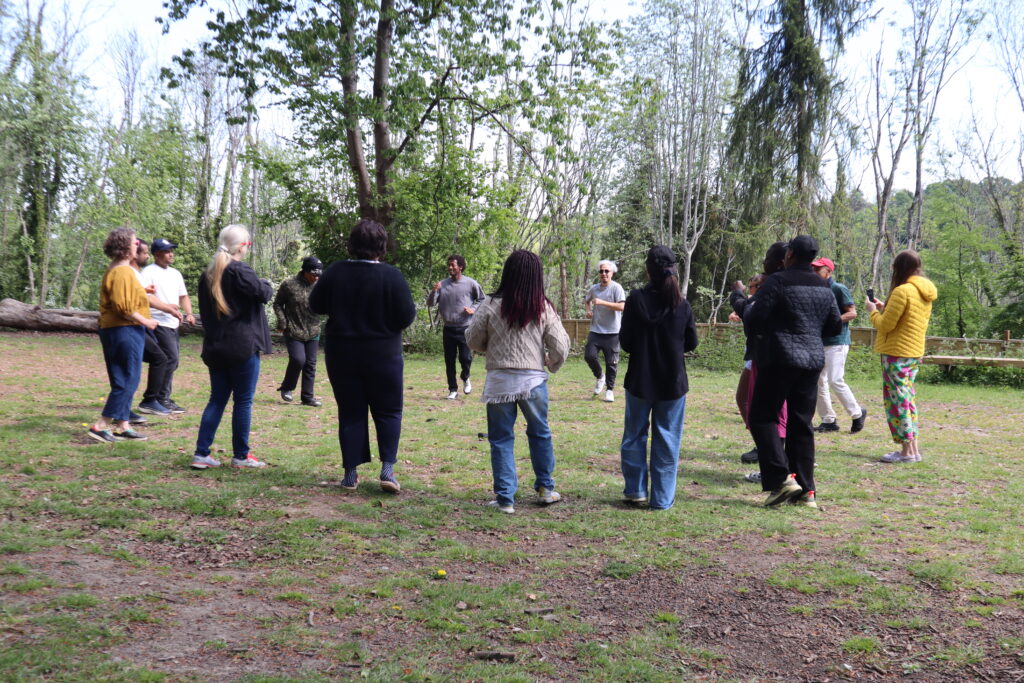
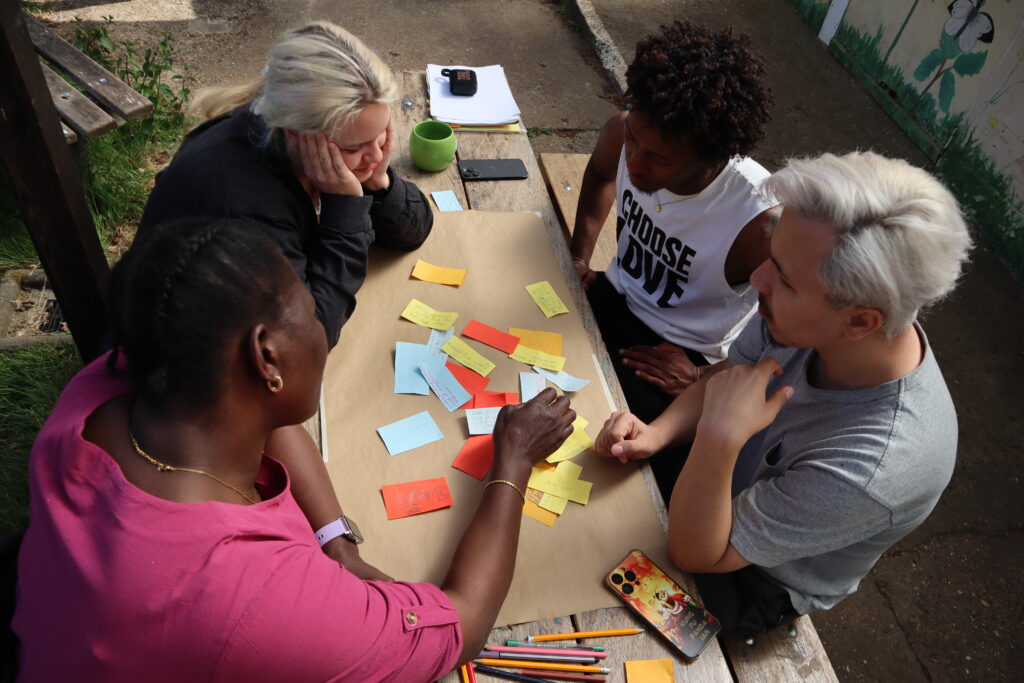
Image 6: Playing with language and meanings of care.
Images © Rebekka Hölzle.
As facilitators and researchers on the project, it was hard to find a balance between making sure the group – many of whom were living in inadequate and unwelcoming asylum accommodation including hotels, unable to work and still experiencing the trauma of waiting for their asylum outcome – were able to relax and make the most of being in a new space, while also developing activities and ‘outputs’ that were integral to the project’s aims. This has been a challenge throughout the project: and to our research and practice more broadly. How can we do care-full research and contribute to calls for more care-full practice with marginalised people without reproducing the power dynamics and extractive practices that we’re seeking to resist and question? But also: how can working creatively to explore care and belonging make a difference, both to the government’s increasingly cruel border policies and rhetoric, and to the lives of those living at the sharpest end of them?
We have not arrived at answers to these questions, nor have we come any closer to a definition of care. But delving deeper and opening our imaginations with people positioned in different and uneven capacities to the border regime – yet all invested in changing it – has offered glimpses of how things could be different.
On the last day of the weekend, we worked together to produce a collective zine, inviting people to create their own pages responding to two prompts: what one thing would you change right now to improve the lives of people seeking asylum in the UK? And secondly: what would a more caring world look like? The responses were wide-ranging, with suggestions for immediate changes including lifting the work ban for asylum seekers, simplifying and speeding up the asylum process, and allowing people seeking asylum to study and travel. Juxtaposed with these were images of nature or of groups of people gathering over food or music to signal utopian visions of a more caring world. Yet what struck me was the fine line between the two: the immediate changes and the future-oriented imaginings of a more caring world were closely connected.
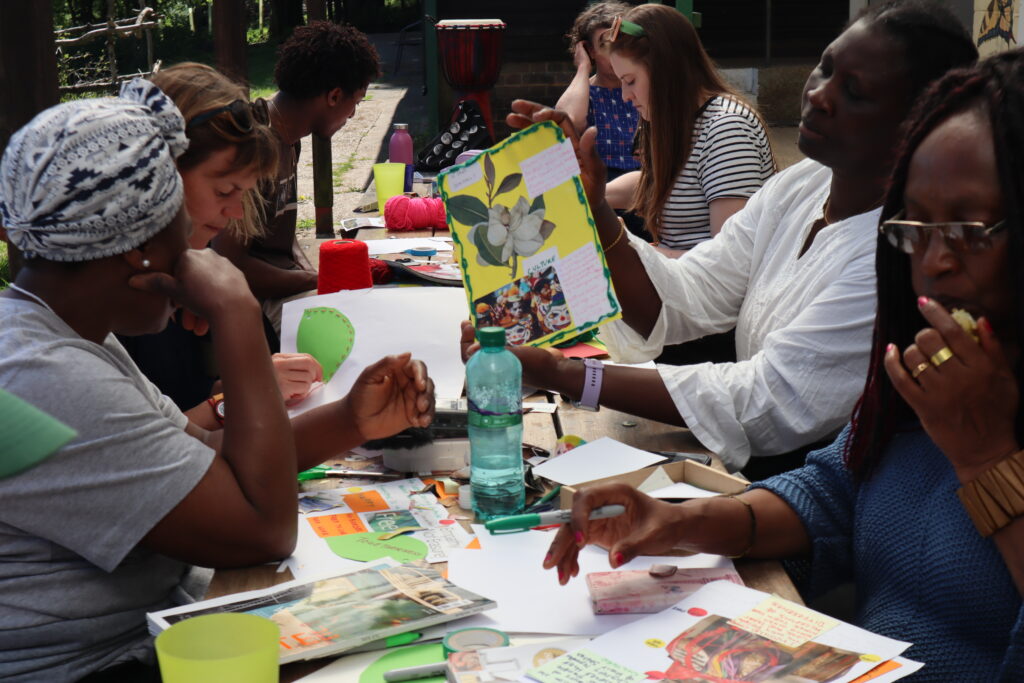
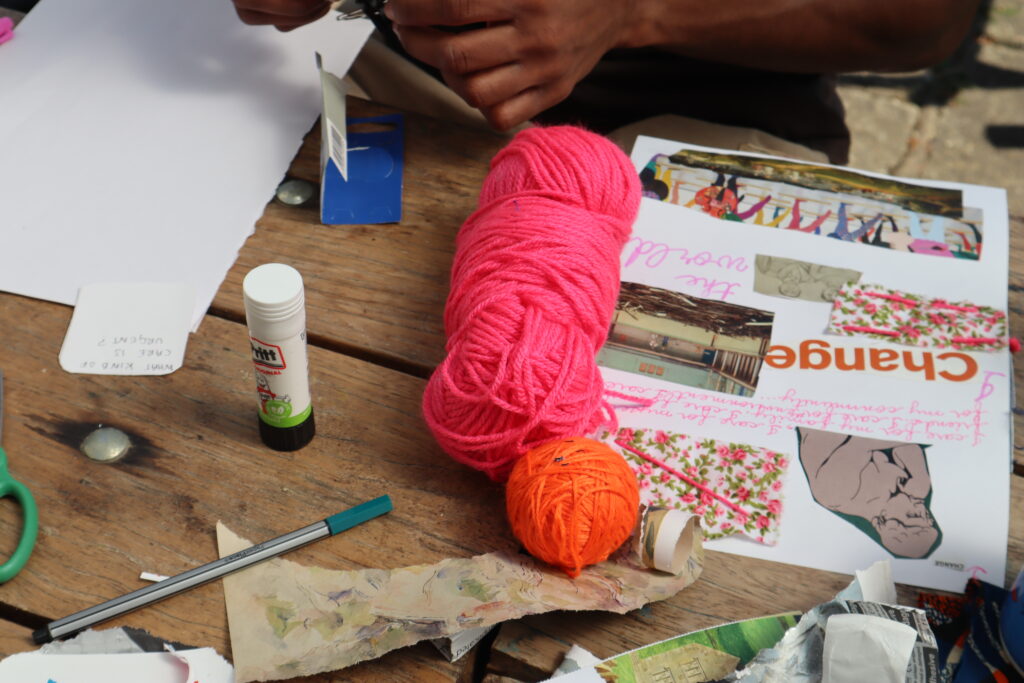
Images © Rebekka Hölzle
There is no single definition of care: it means different things to different people, it is contextual and contingent, and the word can be co-opted to serve uncaring aims. Yet it is clear what care is not. Care is not the current asylum system in the UK, the racialising border regime that filters between deserving and underserving migrants and creates hierarchies of citizenship. Care is not punishing people for claiming support and accommodation while at the same time restricting their capacity to work or to choose their own place to live. Care is not cutting short people’s lives, forcing them into the shadows fraught with danger and precarity.
As the weekend drew to a close, we gathered in a circle and Kate invited us to show, through a gesture or words, one thing that we would take away from the weekend. For some people, it was the food they had eaten and shared with others, whilst for some it was the sense of togetherness they had felt during moments around the campfire. For others it was the new friendships formed, or the first poem they’d written. One participant, Geraldine had taken extra time in the morning’s zine-making session to weave a small bag using strips of coloured paper. During these final moments of sharing, Geraldine held up the bag with pride and described it as a ‘little bag of care’, one that she would be taking home with her. Perhaps the weekend was like this little bag of care. Small, simple, fragile yet care-fully crafted. Holding within it the possibility of being taken back to London, being carried around and opened in a different space, offering a glimpse something else. Something else that is possible.
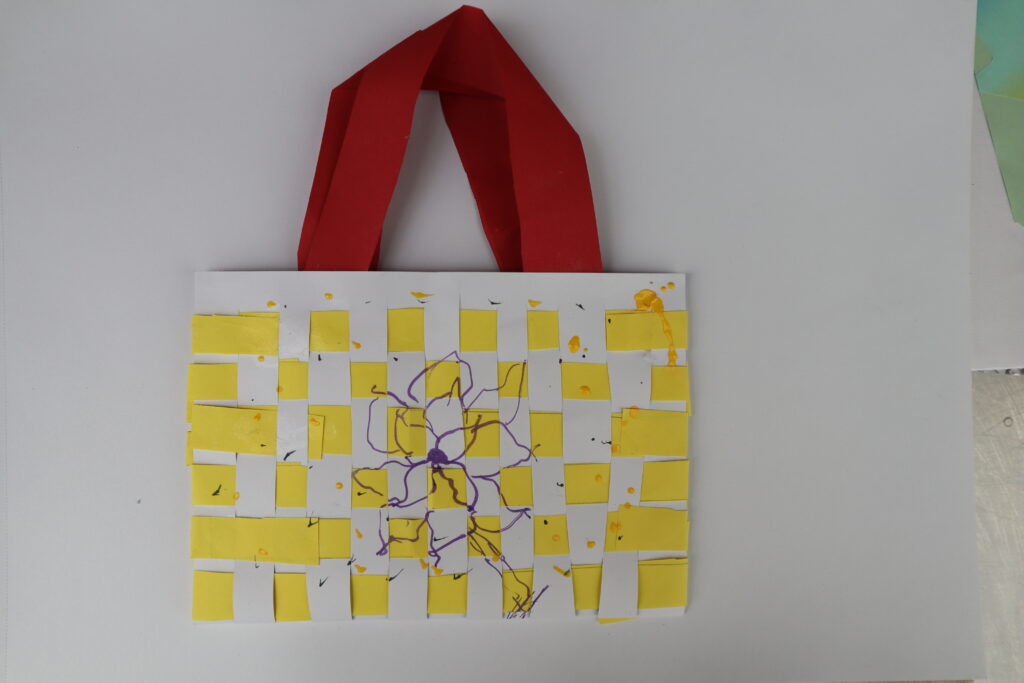
Images © Rebekka Hölzle
Listen to Dr Olivia Sheringham in conversation with co-facilitators from the two partner organisations involved in the project: Helen Taylor and Pamela from Stories & Supper, plus Kate Duffy-Syedi and Abel Atsede from Phosphoros Theatre, below.
More information: